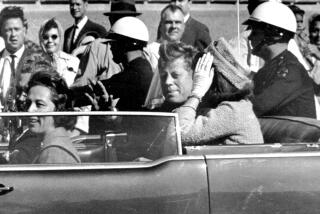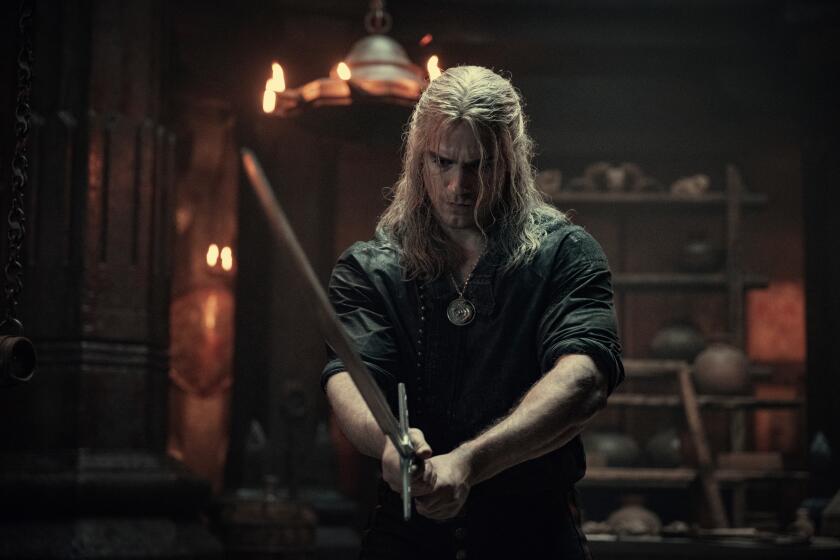Review: ‘The Roosevelts: An Intimate History’ by Ken Burns is thorough
Ken Burns, that maker of Great American Documentaries, has made a 14-hour documentary about three great Americans.
“The Roosevelts: An Intimate History,” which begins Sunday on PBS, tells in seven parts the linked yet also quite separate stories of presidents and fifth cousins Theodore and Franklin D. Roosevelt, and of Eleanor Roosevelt, Teddy’s niece and goddaughter and Franklin’s cousin and wife. Their stories have been told before, to be sure — individually, in different combinations, from different angles and in different contexts, both as documentary and as drama — but never at such length, thoroughness and detail.
Clearly, Burns and frequent collaborator Geoffrey C. Ward, who wrote the series and is first among its on-screen commentators, have set out to make this the definitive work — the last Roosevelt documentary you will ever need. One feels they must have included every relevant film clip and photograph they could find — not so much from an inability to edit as from a desire to immerse the viewer in those faces and times.
All three Roosevelts knew suffering and were transformed by it; they were characters of great will and of good will. And though TR and FDR belonged to different parties, both believed that the country was bettered by the betterment of all its people, and that the excesses of industrialism and capitalism needed government regulation and intervention to keep them in check. Teddy’s policies, no less than Franklin’s, would be considered radical by his party today. The two presidents were men who needed to be loved but were not afraid to be hated.
Teddy, who in his time and since was regarded as a paragon of robust energy, with his “Bully!” and “Dee-lighted!,” eating a dozen eggs for breakfast every morning and drinking coffee from a mug “as big as a bathtub,” reading a book a day, writing or dictating 150,000 letters in his lifetime, suffered from asthma as a child and was protected from bullies by his younger brother Elliott (later Eleanor’s father). Even in college, a doctor told him he had “a weak constitution and a poor heart” and probably would not live long. He seems to have willed himself toward health (“Get action, do things, be sane, don’t fritter away your time, create, act, take a place wherever you are and be somebody”) and to have battled depression (especially after the deaths of his mother and first wife within a single day) with ceaseless activity: “Black care rarely sits behind a rider whose pace is fast enough,” he wrote.
Franklin had trouble fitting in as a young man — he is a melancholy-looking youth in early photos as opposed to the widely smiling politician. The polio that robbed him of use of his legs — an affliction he took great, painful care to mask — came upon him late, at 39, the same age that Teddy set off for Cuba with the Rough Riders, eager to get into a patriotic brawl. (“Theodore Roosevelt, we should say this bluntly, liked war,” says George Will.) It also kept him out of politics at just the right time: the Republican 1920s, it is suggested, might have been the end of his career.
Eleanor’s mother called her “granny” and criticized her looks; her father was a delusional alcoholic. She was an orphan by 10 and raised without affection by her grandmother, happy only when she was sent to a girls school outside London, where social consciousness and independence of mind were encouraged. You can see a spark in her, though, from a young age, as Franklin did. They were engaged when she was 19 and he was 21, and if they later looked elsewhere for emotional support and intimacy, the pictures of them as a young couple are delightful.
You become so familiar with these people, following them from birth to grave over so long a time that you can almost feel them grow and change and age. (Their own words are read by Paul Giamatti, Edward Herrmann and Meryl Streep as Theodore, Franklin and Eleanor, respectively.) Primarily, it is a story of personalities, and the way that psychology animates policy; at the same time, it’s a slow ride through a century of American progress, in telling images, lovingly scanned, and many so clear and vivid as to feel almost contemporary. If Burns’ customary elegiac pace doesn’t always work for his subjects — it is the opposite of everything we’re told about Theodore Roosevelt, at least — he gives you time to really look at what he’s brought to show you.
---------------------------
‘The Roosevelts: An Intimate History’
Where: KOCE
When: 8 p.m. Sunday - Saturday
Rating: TV-14 (may be unsuitable for children under the age of 14 with advisories for coarse language and violence)
More to Read
The complete guide to home viewing
Get Screen Gab for everything about the TV shows and streaming movies everyone’s talking about.
You may occasionally receive promotional content from the Los Angeles Times.







